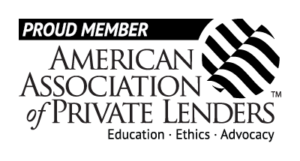Private Lender vs Hard Money
One of the most common questions that I’m asked is “what’s the difference between a private lender vs hard money”? Hard money loans and private money lenders are two kinds of non-traditional loan choices for borrowers that will not get approved for or do not wish to get a loan from standard loan providers. A hard money lender is a specialist lender that’s not a bank or credit union, and a private lender is any individual who you may know that is willing to loan you the money.
Using either kind of loan provider has its pros & cons. Hard money loans tends to be more restricted in scope than a private loan. If your requirement for a loan falls within the requirements for a hard money loan, you might want to choose a hard money loan vs private lender funding.
Both mortgage providers have lower barriers to lending, however the hard money lenders are licensed and need to follow regulation & financing laws for their loan programs. On the other hand, a private lender is under no commitment to follow financing laws.

Choosing hard money vs. private lenders
You should to always thoroughly think about the function of the loan together with the kind of loan you’re interested in getting. Are you considering a cash out refinance, bridge loan or a home equity loan for bad credit? What is your exit strategy for when the loan comes due and are you ok with a prepayment penalty?
The following is a look at a hard money loan vs private lender loans, and the type of experience you’re most likely to have when aiming to acquire either type.
As you check out hard money vs a private lender for financing, you will not see a great deal of distinction between the two initially. Both usually have the exact same kind of payment terms, interest rate and guidelines set by the lender. The significant distinction in between the two types boils down to the individual or entity behind the loan.
A private lender is somebody who provides money, however does not have a license for structured financing. No laws specifically prohibited individuals from lending money, and a private lender can sometimes charge whatever interest they like on a loan. There are some advantages to private money vs hard money when it pertains to getting a loan, however private lending institutions tend to be individuals you have an individual relationship with. There is usually trust or a bond already built in with the private lender.
A hard money lender is licensed and certified and for that reason needs to follow guidelines that govern the lending of money. You have access to regulations and government entities that does not exist with a private money lender. As you take a look at a hard money lender vs a private lender, you’ll discover the hard money lender can provide fair and reasonable loan terms, in addition to an experienced expert to help you navigate the mortgage lending path.

What is a hard money loan?
A hard money loan is a loan that utilizes a borrowers property as collateral and the requirements for lending are typically a lot of equity in the subject property as well as condition and location. Income documentation and credit scores are not typically a focus for approval.
The word ‘hard’ in this circumstances describes that the loan is being funded with the support of a “hard property.” Many borrowers promise their house or commercial property as collateral.
This kind of loan is an alternative to conventional kinds of mortgage loans due to the fact that there’s a lower barrier to receiving financing and is generally quickly funded.
HARD MONEY PROS
Lenders are semi-institutional
Hard money lenders are similar to conventional lending institutions in terms of the licensing, disclosures and compliance. You speak directly to financing professionals who hand hold you through the procedure and discuss the financing terms with you.
Accredited for real estate financing
A lot of hard money loan borrowers are in the real estate industry. They look to obtain large amounts of money against their homes or commercial properties, then pay back the loan once their task is completed. This could be a fix and flip or new construction. Hard money lenders are licensed to provide money for this and related functions.
Loans close much faster
A hard money loan does not utilize the debtor’s credit report scores and earnings to finance the loan. Rather, it utilizes the value of the residential or commercial property that the customer is promising to secure against the loan. Less time is invested by the underwriter in figuring out the capabilities of the customer to pay back the loan… much less paperwork which leads to faster financing.
HARD MONEY CONS
Higher rate of interest and charges
Hard money loans require less paperwork from the borrower and a much easier pathway to an approval, thus a higher risk of default. The lender charges greater origination costs and interest rates to hedge against default by the customer.
Short payment durations
A hard money loan is a tool for quick infusion of money to wither purchase a property for do a cash our refinance. Hard money loans are typically for 1-5 years.
Minimal paperwork for approval
The function of a hard money loan is to assist a customer gain access to funds that allow them to purchase a home quickly, flip a home, begin new construction or infuse much needed capital into an existing business with self employed mortgage loans. Without the need for a lot of documents by the borrower, the loan can be approved, funded and recorded much quicker.
Loans max out at around 65% of the worth of the property
You will not have the ability to get 100% financing versus the value of your property like some conventional loans offer. A hard money lender tends to loan no greater than 65% of the worth of the property in order to protect the equity position. This maximum LTV/CLTV in place regardless of the hard money loan programs such as DSCR loans, probate real estate loans, trust loans or estate loans.

What is a private money loan?
A private lender is a standalone operation or an individual who wants to loan money with common payment terms. That is, the private lender isn’t associated with a bank or credit union. They provide money in the same way as a public entity, however a private lender is most likely to deal with borrowers who have less than the best credit.
The significant distinction between hard vs private money mortgage lender boils down to the fact that a private lender is usually somebody you know.
PRIVATE LENDER PROS
No credit check
A private lender typically relies on the equity position and title report to finance the loan. They might not run a credit check to identify your capability to pay back the new loan.
Easy to acquire
A private lender might not ask for any paperwork or they might have an simple agreement drawn up that describes standard terms such as principle and interest, payment however that’s about it.
PRIVATE LENDER CONS
May not follow current lending laws
A private lender isn’t beholden to federal financial lending laws. They can put their own terms on the loan that you have to abide by, regardless of how reasonable or unreasonable they are. You’re under no commitment to take the cash that’s provided.
Generally from somebody you know
Never a good idea to borrow from friends or family since future problems could arise in paying back the loan. Do not ask for assistance from a private lender if relationship is not worth losing. Choose to preserve your relationship and prevent the danger of something going wrong with your capability to pay the loan.
May not accept a grace period for payment
Private loan providers are lending money out of their own pocket. Your lender might not be ready to renegotiate payment terms if your strategies to pay back do not go as planned. This can result in the loan coming fully due or an outrageous penalty tied to the interest rate.

How to decide which loan is right for you
Prior to you approaching a hard or private money lender, you need to determine the reason you require financing. The hard money lender is an exceptional resource for times when you require money quickly and want to make sure all state and federal regulations are being followed with the property disclosures, etc.
A private loan is casual and includes asking somebody you know, such as a relative or friend, for money. Going this path risks ruining the relationship with the lender and can open you to undesirable long term results.
We Specialize in Hard Money Loans for in Arizona, California, Florida and Texas. For a cash out refinance, we have experience with bad credit mortgage loans and we can identify just how much you might be able to obtain quickly. Our underwriting team focuses on the current value of the collateral, instead of your credit scores or proof of income. Contact us today to see if you qualify for our bad credit home equity loan program.
Independent Lending Recently Funded Loans
Related Articles
Requirements for Hard Money Loans | What is a Second Trust Deed Loan | Business Purpose Loans & How They Work | Can I use a HELOC as a Bridge Loan in California | Can I Get A Loan On A House In Probate, In California? | Can an Irrevocable Trust Get a Mortgage Loan in California | What is a DSCR Loan | What is a Trust Loan | California Hard Money Loans for Bad Credit | Non QM Loans




